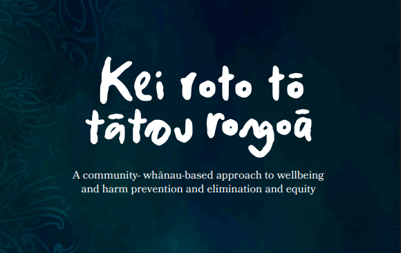Mobilising Aotearoa New Zealand to prevent sexual violence: a Te Tiriti approach.

Mobilising Aotearoa New Zealand to prevent sexual violence: a Te Tiriti approach is the result of a collaboration between tāngata whenua and tāngata Tiriti sexual violence experts. The collaboration arose out of a recognition of the need to develop evidence-based and culturally informed approaches to guide sexual violence primary prevention in Aotearoa. This mahi aligns with the shifts outlined in Aotearoa’s national strategy to eliminate family violence and sexual violence, Te Aorerekura.
This Issues Paper articulates key concepts and ideas necessary to end sexual violence in Aotearoa, discusses the development of these approaches and provides guidelines to support their implementation. It also provides questions to guide organisations and communities to develop their own initiatives for the prevention of sexual violence.
Alongside the Issues Paper, Vine have also published two evidence summaries that outline the key evidence bases underpinning sexual violence prevention:
- Primary prevention of sexual violence: Tāngata whenua evidence summary report
Authors: Terry Dobbs (Te Rarawa, Ngāpuhi), Logan Hamley (Ngāti Rangi, Whanganui), Jade Le Grice (Te Rarawa, Ngāpuhi), Charlotte Moore (Rangitāne o Wairau). - Primary prevention of sexual violence: Tāngata Tiriti evidence summary report
Authors: Melanie Beres, Jordan Dougherty, Kris Taylor
Key messages:
- Strategies for primary prevention require a clear logic for how any activities contribute to the broader project of ending sexual violence.
- When designing sexual violence prevention initiatives, engaging with the origins of sexual violence must be at the centre.
- Honouring Te Tiriti o Waitangi means acknowledging Māori knowledge systems and self-determination.
- Kaupapa Māori primary prevention services are an essential part of the primary prevention system within Aotearoa – working with and within our communities.
- To avoid the dangers of appropriation in the primary prevention system, it is crucial to attribute and situate Indigenous knowledge in relation to the people and places it originates, and by whom this is held and innovated.
- Understanding and addressing imposter tikanga within sexual violence primary prevention initiatives, and the impact of its ongoing use, is essential to prevent sexual violence.
- Effective primary prevention requires time, openness and resilience. Short and quick fixes are not enough to solve this complex problem, and in some cases can further entrench the very structures they aim to challenge.
- A one-size-fits-all approach does not work. Prevention needs to resonate with and be embedded within communities.
- Working with communities means understanding the diversity within the community and listening to their hopes and dreams for ending sexual violence. Primary prevention systems need to meet communities where they are, as well as act as enablers to grow successful prevention initiatives and build capacity.
- Funding structures need to resource locally-driven community partnerships.
- Change requires collective courage – to be courageous, bold, and unapologetic. It cannot be achieved by doing what we have always done.
Dobbs, T., Beres, M.A., Hamley, L., Dougherty, J., Le Grice, J., Moore, C. & Taylor, K. (2025). Mobilising Aotearoa New Zealand to prevent sexual violence: a Te Tiriti approach. Issues Paper 17. Auckland: Vine – Violence Information Aotearoa, University of Auckland.










